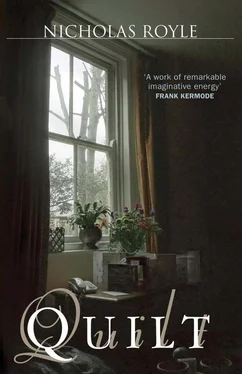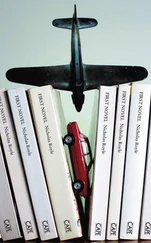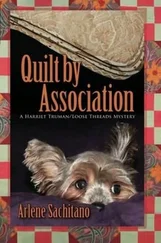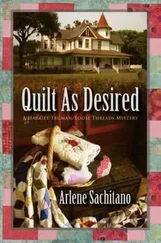Nicholas Royle - Quilt
Здесь есть возможность читать онлайн «Nicholas Royle - Quilt» весь текст электронной книги совершенно бесплатно (целиком полную версию без сокращений). В некоторых случаях можно слушать аудио, скачать через торрент в формате fb2 и присутствует краткое содержание. Год выпуска: 2011, Издательство: Myriad Editions, Жанр: Современная проза, на английском языке. Описание произведения, (предисловие) а так же отзывы посетителей доступны на портале библиотеки ЛибКат.
- Название:Quilt
- Автор:
- Издательство:Myriad Editions
- Жанр:
- Год:2011
- ISBN:нет данных
- Рейтинг книги:4 / 5. Голосов: 1
-
Избранное:Добавить в избранное
- Отзывы:
-
Ваша оценка:
- 80
- 1
- 2
- 3
- 4
- 5
Quilt: краткое содержание, описание и аннотация
Предлагаем к чтению аннотацию, описание, краткое содержание или предисловие (зависит от того, что написал сам автор книги «Quilt»). Если вы не нашли необходимую информацию о книге — напишите в комментариях, мы постараемся отыскать её.
Quilt — читать онлайн бесплатно полную книгу (весь текст) целиком
Ниже представлен текст книги, разбитый по страницам. Система сохранения места последней прочитанной страницы, позволяет с удобством читать онлайн бесплатно книгу «Quilt», без необходимости каждый раз заново искать на чём Вы остановились. Поставьте закладку, и сможете в любой момент перейти на страницу, на которой закончили чтение.
Интервал:
Закладка:
Neither fish nor fowl, they move like moles in the gravel of the substrate, burrowing and blowing up air, like animated pancakes, or stay at rest on the bottom, half-hidden dark moons. Or they glide through the water like ghosts on a shopping spree in an empty mall. But the otherworldliness is constantly undercut by a kind of normality. They gently bump into one another and shift accordingly, like courteous commuters. They eat with their little plates of teeth, grinding up whatever it is they select as the plat du jour . They shit into the watery depths, like muting birds in flight. They indulge in sexual congress, though it was a fair number of visits to sea-life centres before finding ourselves one day, in Portugal, peculiarly a party to that voyeurism.
How to talk about them? They are eerie machines for creating and overturning words. Every time you think you have come up with an appropriate way of describing them, a submarine bird or robotic frittata or psychodelic beret, you are undone. You’re mere bystanders. They’re Teflon: nothing sticks because in reality they are the cooks, the makers, somnifluent agents of provocation and alterity in a maddening game with invisible rules in operation before you set eyes on them and being perpetually revised. But nothing sparks talking like the constraints of doing so. Our telephone conversations thus find respite of sorts, from the more or less constant anxieties over which we range, regarding nightmares and eye problems, the apparently never-ending business of clearing the house and gardens, and how rawly we experience each other’s absence.

One morning (for it is morning in my time-zone) you sip from your glass of ice-cold Aspall and describe how Mallarmé is nudging up the side of the tank to within a foot of your face. From the patina of ocellation you have learnt to distinguish easily between the rays and, picturing these differences, I have memorised them so that I can follow. Of course the single male is the most immediately identifiable, having claspers.
— It’s a completely different world, you say.
I assume you’re referring to the pool. But you go on:
— The totter has gone.
I have to cast my mind back.
— The beautiful lionish man: vanished ! He hasn’t been there since we saw him there together, just before the funeral. I meant to tell you. It’s a completely different world.
— At the tip?
— Everything is being stripped away. I can’t express it. I’m experiencing new, incredible possibilities. It’s a kind of magical sharpness, as if shadows have light, and the totter’s disappearance belongs to a time that is coming back but for the first time. It has to do with that mimosa thing I told you about. It’s a kind of upside-down space of coincidence, a portal. I can’t stay …
Your voice is strained and I’m having real difficulty following what you are saying.
— What is happening there? Are you missing me?
— I can’t wait to see you again. But the weirdest thing has just happened. I wonder if I’m not going completely off my head.
A long pause ensues. An expanse of hundreds of miles of deep cold sea dangling the frailty of a telephone is not a reassuring medium for a long-term relationship.
— What do you mean?
— I’ll write. I love you.
Then you hang up. I call back but there’s no answer.

There is no internet at the house, but you must have gone, as you sometimes do, to the café in town to write: the Tea Party, as it’s quaintly called. For a couple of hours later an email arrives, in which you explain that yesterday afternoon, having just overseen the day’s final fire of ripped-up nettles, clipped brambles, hedge trimmings and scythed grasses, eyes a-blur stinging and watery from acrid smoke, a slight breeze at the fireside an almost pleasurable twisting of a knife swirling smoke one way then another, walking up the steep back lawn towards the house bulking up with almost manorial proportions above you, it occurs to you, a decision precisely contrary to all your desires and hopes. You’re going to sell the house. You phone the estate agent and a meeting is arranged. And so this morning the gentleman duly appears and enthuses and proposes an asking price and takes photos, starting with the gardens from this and that boundary or angle, standing on a woodworm-eaten ladder (a big man, perspiring in a suit and tie, trying to get the best photogenic perspective) which snaps clean through under his weight and he tumbles vaudeville roly-poly down the slope of yellowing grass. And inside he clicks and slicks away at this and that room, deterred only here or there. Naturally, unphotographably, your father’s study remains the last stronghold of chaos. The biggest obstacle, of course, is the first thing inside the front door (but Shakespeare, you want to say, is working on it). The agent’s lack of surprise suggests he has been tipped off (down in the town things get about). Encountering what was once a dining room now a major aquatic display he blandly enquires what you plan to do with it.
— Not, he queries chuckling, presumably to be part of the fixtures and fittings?
— I’d be taking that with me, you say, struck momentarily by the enormity of doing so.
— What are they in there anyway? asks the man, stooping a little and peering in.
And then one of them, Taylor, flaps into vision, and it occurs to you that you haven’t in fact shared the secret of the rays with anyone since the funeral.
— Curious, exclaims the visitor. Like an underwater kite.
There is now a delayed version, you suggest, a shadow-replay of his falling through the ladder five minutes earlier and almost breaking his legs when, his curiosity getting the better of him, the agent goes to put his hand near the surface of the water as Taylor edges up close and you, rallying to the defence of both parties, pull the arm back, exclaiming at the danger of the spine lashing his hand. Stung at any rate mentally, the estate agent remarks that it is not going to be easy transporting a contraption of dangerous creatures that size and you have to agree. Surveying the upstairs rooms he more than once poses the question of the fate of other furnishings and items obviously capturing his business eye.
— Some nice furniture, he remarks. Will you be instructing the auctioneers in town?
A query too far for you at this moment, you merely note you have not yet decided what to do with it, and the agent with newfound gusto and boldness avers that while the condition of the house, so obviously in need of modernisation, is not going to put off a prospective purchaser, given that the price would be tailored to that fact, and while such a person would be attracted as much as anything else by the size of the plot of land coming with the property, nonetheless a bit of tidying up and clearing space in the bedrooms and the drawing room downstairs might be advantageous for the purpose of viewings.
— Your father’s study in particular, he sighs with but a thin veneer of professional decency.
He leaves you with the promise of papers to sign, coming with luck in the post next day, and an unnecessarily impactive handshake.
Five minutes later you too drive out, seeking replenishments of your favourite bottled cider.
It happens, or has already begun, on your return. There is a sound coming from the kitchen. You can hear it above the noise made by the water-pump in the pool as you come through the front door. There is, you write, a resting place in every mental archive, a discrete space of effects walled up without a listener’s awareness. Most remain unnoticed in the dull daily roar. Then there are the others, those isolated, unmistakable sounds which, once heard again, transport more directly and more frighteningly than any odoriferous power of reminiscence or snapshot visual recall. Of course there is a kind of common stock, shared files of archetypal distinction, the sound of rock falling, a footstep where none is expected, the thrown vocable of a diabolical chuckle, the autumnal rustling of trees, a snatch of distant seas shrugged off in the dozy instant. But there are also sounds peculiarly your own, received and buried, as it were, in your heart of heart. It is what you mean, you remind me, when you tell me I am your pristine.
Читать дальшеИнтервал:
Закладка:
Похожие книги на «Quilt»
Представляем Вашему вниманию похожие книги на «Quilt» списком для выбора. Мы отобрали схожую по названию и смыслу литературу в надежде предоставить читателям больше вариантов отыскать новые, интересные, ещё непрочитанные произведения.
Обсуждение, отзывы о книге «Quilt» и просто собственные мнения читателей. Оставьте ваши комментарии, напишите, что Вы думаете о произведении, его смысле или главных героях. Укажите что конкретно понравилось, а что нет, и почему Вы так считаете.












